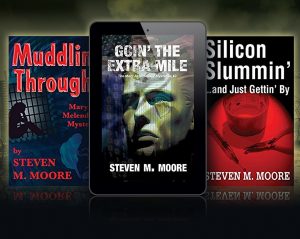Speculative Fiction #3: Sci-Fi vs. Fantasy…
While Margaret Atwood would lump both of these genres under her catch-all category “Speculative Fiction,” they’re really very different, even though a bookstore might ignorantly shelve them in the same section. Sci-fi peers into the realm of the possible and is often an extrapolation of current science and technology; fantasy peers into the realm of magic and the impossible and generally ignores all science and technology. Many scientists read sci-fi but eschew fantasy; many authors who are ex-scientists write in many genres but usually not fantasy.
I personally think many authors who write fantasy are often just lazy at best (they don’t want to learn the science) and anti-science at worst (they hate science). The good ones at least make sure their fantasy universes have a consistent set of rules, and sometimes their stories can be literary masterpieces; the bad ones don’t seem to care. (J. K Rowling fails miserably at consistency, and her work is filled with deus ex machina situations as a result.) Many young writers don’t like science or understand it, so they’d rather invent an impossible tale that stirs up emotions and excludes logic and reason. It’s better to do both: create a story that celebrates humanity with its interesting mix of both emotions and logic and reason…even if it’s a fantasy story.
Of course, the boundary between sci-fi and fantasy is fuzzy. Always has been. One can even see them overlap in one novel. For sci-fi, it often comes down to how well the extrapolation of current science and technology is done. The farther one moves into futuristic settings, the more the science seems like magic. Clarke said that any really advanced technology can seem like magic for that reason. Just think of the cellphone, that little rectangular device that seems like a human appendage now, and how it would seem to a caveman. Hell, even in the original Star Trek, “communicators” seemed so futuristic, yet they’re ubiquitous today; and some of Bones’ diagnostic devices are incorporated in Apple watches!
Fantasy doesn’t even bother to explain how things work. You might want a wand like Harry Potter’s, but Rowling can’t tell you how to make one or how it works without a bunch of fantastic mumbo-jumbo verbiage. And good luck in getting one…or finding that train station in London. Really?
I’ve heard people complain that sci-fi is pure escapism. Maybe. It shares that quality with most fiction. We often read to experience things we can’t experience in everyday life. And that escapist criticism applies in spades with fantasy, where mythical creatures and absurd situations abound.
I don’t know where the border between sci-fi and fantasy lies. I just know I can determine if a novel is mostly sci-fi (some have fantasy elements) or if it’s mostly fantasy (some pretend to be more science-oriented). I like to read the former but not the latter, in general. Your reading choices might be different.
I do know that I don’t like online or brick-and-mortar bookstores to conflate sci-fi and fantasy—they should know better. I also know they both shouldn’t be considered part of speculative fiction, which is such a large category that it’s completely meaningless.
***
Comments are always welcome.

“Mary Jo Melendez Mysteries.” This mystery/suspense/thriller trilogy follows the adventures of ex-USN Master-at-Arms Mary Jo Melendez. InMuddlin’ Through, she leaves the Navy and gets a new job working in security in a company that makes MECHs (“Mechanically Enhanced Cybernetic Humans”), mechanized warriors for a secret Pentagon project. The MECHs are stolen, and Mary Jo is framed for her sister and brother-in-law’s murders. After some time in prison, she escapes and begins an odyssey to clear her name, but a secret government group is after her; they want her to get the MECHs back. In Silicon Slummin’…and Just Getting’ By, she starts a new life in Silicon Valley, this time as security head for a computer games outfit. Two teams, one US and the other Russian, now want the MECHs, and they think she knows where they are. And she also is pursued by a stalker. An autistic kid helps her. In Goin’ the Extra Mile, she now has Chinese agents after her. They kidnap her family, and she has to go to Beijing to save them.
“Reading gives us someplace to go when we have to stay where we are.” Mason Cooley. Here’s lots of reading entertainment available on Amazon and Smashwords and all the latter’s affiliated retailers (iBooks, B&N, Kobo, etc.) and lending and library services (Scribd, Overdrive, Baker&Taylor’s, Gardners, etc.). Enjoy!
Around the world and to the stars! In libris libertas!

June 18th, 2020 at 4:05 pm
I’ve always felt that the term “speculative fiction” should be reserved for those works which try to extrapolate current knowledge and paint a picture of a future, however far flung, that is a possible result of that knowledge or that social situation. Several of your books qualify as speculative fiction. KS Robinson does as well. Most good SF does. No fantasy does.
I think of it as a noble thought experiment. Which is why I don’t really consider thriller and mysteries and literature to be speculative fiction. I don’t see how they make an extrapolation and draw a picture based on that extrapolation. Just my two cents.